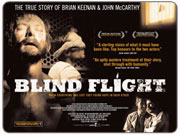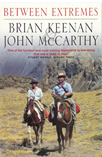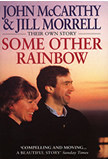

What was it like for John McCarthy enduring 1,943 days of squalid captivity? How did he overcome physical and mental torture, doubt and despair? What was it like to be captured by Lebanese fanatics? |
John McCarthy's StoryLIVING with the constant threat of execution was an unbearable strain on the likeable young television journalist on the first rungs of broadcasting management who was captured by Lebanese extremists on his journey home to the airport. He knew Beirut was a hotbed of tension and danger. But the last thing on his mind as his battered taxi navigated back streets to the airport, was kidnap and capture. Life was good working as a journalist in a television news agency and he’d been delighted to be given his first foreign assignment managing news crews for a month. Even when kidnappers brandishing Kalashnikov rifles blindfolded him and bundled their prize into a car, he had the surreal feeling it was a scene from a film and somehow, he’d managed to acquire a part. When John was finally left in a small dark prison the size of a horsebox with nothing but his fears and other people’s excrement for company, the loneliness was intense. The words of his news editor friend Nick Toksvig began to haunt him. Only hours before the mad dash to the airport to escape hostilities, the brother of Sandi Togsvig warned: “Keep your head down.” The world as he knew it had stopped. There were no more press conferences and interviews and chats with friends in the office and relations at home. Life had come to a halt and the only thing yawning in front of him was isolation. His companions in the early days were a copy of Newsweek and Time and two novels. But the book which stood out from the crowd and was ultimately to be part of his salvation, was the present given to him by his mother - Beyond the Euphrates by Freya Stark. Sadly, she never knew the importance of her present because she died during his long captivity. The book is a tale of courage and determination on the part of the author who was a fiesty woman travelling alone in the Middle East during the 1930s. Every now and then the guards would take his novels away and it wasn’t until Freya Stark’s book was returned with pencil marks written down the sides of some pages that John realised he was not alone in his enjoyment. Fellow European captors Brian Keenan and Terry Waite were sharing the book with him. The phrase: “Exercise, the attainment of knowledge, the practice of affection - the three best in mankind, and beyond these a gift of the spirit which is divine,” was especially comforting even at the lowest times when all he could hear were the screams of other inmates or the deafening silence which spelled the end of cruel torture for some pour soul. He tells audiences that he was bewildered about the capture and even now, the reasons are still unclear. At first he thought it was a terrible mistake and that his captors wanted American or French hostages. “As time went on I had to face up to the terrible irony that, if I could think of no real reason for my captors holding me then neither could I think of any reason why they’d let me go. But still I refused to think that I’d be there for anything more than a few days, a week or two at most. Anything beyond that was unthinkable.” Ironically one of the first things he did when thrown into the cell was to tidy it. He recalls desperately trying to impose his own sense of order and shaking out the blankets and pumping up the greasy pillow. This small action somehow gave him a sense of achievement and brought a little control into a life where others were singing a nasty tune . Nevertheless he spun into a destructive spiral of self-doubt and unhappiness in the first four months of isolation. He wished he had paid more attention at college and kicked himself for not knowing more about the world. There was a desperate need to occupy his mind and he kept reminding himself of Franklin D. Roosevelt’s maxim: “The only thing we have to fear is fear itself.” Unlike some of the hostages, who had top jobs in Lebanon, John came to terms with the fact that he had entered a world where the past didn’t exist. “Whatever we had been we were now reduced to nothing and that’s a very difficult thing to come to terms with. I think the older Americans, who were at the pinnacle of their careers found this extremely difficult,” he says. Mosquitoes made it impossible to relax. He was given a candle and matches but the little beasts were attracted by the light. His book recalls: “They made a phenomenal row, determined and aggressive, attacking me where my skin stretched tightly over my bones, on my ankles and on my wrists. The pain was excruciating and I soon learned that it was fatal to scratch the bites. Instead I would ineffectually dab them with water or spit in an attempt to take the heat out of the stings. Sometimes it got so bad that I had to get under the filthy blankets to hide from the hordes.” Amazingly, it wasn’t all gloom and doom. He feels enriched by ultimately sharing his cell with Irish lecturer and philosopher Brian Keenan. Their horseplay, sense of humour and courage was a lifesaver in every sense. There was comfort in not being alone with a problem and resolving difficulties and conflict together and enjoying the bliss of comradely silence and brotherly wisdom. After the initial hesitation about meeting a stranger, the two men were to bond in a way that perhaps only twins can imagine. Of the early days John says: “We discovered how prolonged and painful introspection had brought us both to the verge of nervous breakdowns. Very quickly we grasped that we had to be open with each other and at the same time be careful to give each other optionally as much of the commodity that we most lacked physically, space.” The duo sometimes mocked their captors and also tried to understand their zealous religious beliefs. Hellish moments such as the times when they were gagged and bound from head to foot in sticky tape like modern day mummies were hard to forgive and forget. Reliving the moments of claustrophobia and panic as they lay hidden in the base of vehicles during high-speed car dashes from one nasty cell to another, is an electrifying revelation. But there were happier times such as the tale highlighted in the book, telling about the unexpected celebration for John where the guards actually sang ‘Happy Birthday’ at the tops of their voices in an attempt to diffuse the suffering. Unfortunately these moments were rare and short lived. Some of the guards tuned into the banter between the pair and those who vaguely understood about the ‘Irish troubles’ between Britain and Ireland couldn’t understand the closeness of the pair who were from divided and frequently hostile backgrounds. During his presentation, John has some good important lessons about standing up to a foe and keeping the mind alert. John has never really got over the media frenzy on his return. In some ways the press hype he experienced was as bad as the imprisonment and certainly something, which was hard to come to terms with. From being an ordinary bloke one minute he suddenly found himself accorded star or saint status. All he wanted was to be left alone to come to terms with what had happened and to pick up the threads of his career. He desperately wanted normality. Normality for John now, is to tell his story with honesty and conviction. He is pleased that somehow some good is coming out of so much bad. Professional Speaker Bookings Although his talks give a flavour of his imprisonment, they are all tailored to meet specific client requirements and are surprisingly different. John takes care to work to a brief and weave in various lessons he learned in captivity alongside the general story highlighting:
Incarceration taught him many things. He developed techniques to overcome physical and mental torture, self-doubt and despair. He has lessons for sales teams for example about listening to customers, seeking compromise and taking control when life seems hopeless. There are strong messages about leadership and trust and the benefits of giving employees space to express their feelings and opinions. His latest topic is bullying. Audiences are surprised and delighted he stays at events and willingly answers searching questions about his ordeal both in public and private. At one event he met a Nigerian psychiatrist who had been imprisoned and was touched by her story. She was equally thrilled to meet a fellow former inmate who could empathise with her suffering. As a patron of the charity ‘The Medical Foundation for theCare of Victims of Torture’ he knows that imprisonment and torture is a daily fact of life for people around the world. Like his own story, their stories are not all doom and gloom. Some make him laugh. He is touched though by stories about abuse and neglect and especially admires women who have the courage to stand up to their abusers. He raises awareness at all levels during his presentations and says: “Victims of political violence living in poverty on the outskirts of Latin American cities have explained how they can remain non judgmental in the face of the crimes committed against them. Working at asking the right questions and waiting for people to give the answers they want to give are crucial elements of my privileged work.” |
Johns StoryBusiness TopicsPublic SpeakingRave ReviewsThe FilmThe BooksContact John
John McCarthy - A Room54 Business Speaker
Copyright 2007 - All Rights Reserved


